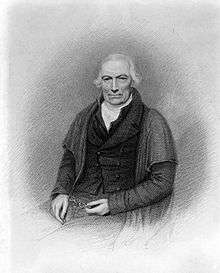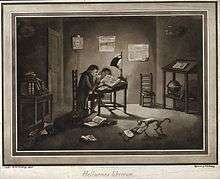Samuel Vince
Samuel Vince (6 April 1749 – 28 November 1821) was an English clergyman, mathematician and astronomer at the University of Cambridge.


Life
He was born in Fressingfield. The son of a plasterer, Vince was admitted as a sizar to Caius College, Cambridge in 1771.[1] In 1775 he was Senior Wrangler, and Winner of the Smith Prize at Cambridge. Migrating to Sidney Sussex College in 1777, he gained his M.A. in 1778 and was ordained a clergyman in 1779.[1]
He was awarded the Copley Medal in 1780 and was Plumian Professor of Astronomy and Experimental Philosophy at Cambridge from 1796 until his death. He became Archdeacon of Bedford in 1809, and died in Ramsgate.[1]
Works
As a mathematician, Vince wrote on many aspects of his expertise, including logarithms and imaginary numbers. His Observations on the Theory of the Motion and Resistance of Fluids[2] and Experiments upon the Resistance of Bodies Moving in Fluids[3] had later importance to aviation history. He was also author of the influential A Complete System of Astronomy (3 vols. 1797-1808).
Vince also published the pamphlet The Credibility of Christianity Vindicated, In Answer to Mr. Hume's Objections; In Two Discourses Preached Before the University of Cambridge by the Rev. S. Vince. In this work, Vince made an apology of the Christian religion and, like Charles Babbage, sought to present rational arguments in favor of the belief in miracles, against David Hume's criticism. A review of this work with direct quotations can be found in The British Critic, Volume 12, 1798.[4]
References
- "Samuel Vince (VN771S)". A Cambridge Alumni Database. University of Cambridge.
- Vince, Samuel (1795). "The Bakerian Lecture. Observations on the Theory of the Motion and Resistance of Fluids; With a Description of the Construction of Experiments, in Order to Obtain Some Fundamental Principles. By the Rev. Samuel Vince, A. M. F. R. S." Philosophical Transactions of the Royal Society of London. 85: 24–45. doi:10.1098/rstl.1795.0004. JSTOR 106943.
- Vince, Samuel (1798). "The Bakerian Lecture. Experiments upon the Resistance of Bodies Moving in Fluids. By the Rev. Samuel Vince, A. M. F. R. S. Plumian Professor of Astronomy and Experimental Philosophy in the University of Cambridge". Philosophical Transactions of the Royal Society of London. 88: 1–14. doi:10.1098/rstl.1798.0002. JSTOR 106967.
- The British Critic, Volume 12 (1798). F. and C. Rivington. pp. 258-263.
External links
| Wikiquote has quotations related to: Samuel Vince |
- On the divisions among Christians: A charge, delivered to the clergy of the archdeaconry of Bedford (1810)
- "The Wright Brothers: Designing the 1900 Wright Glider". National Air and Space Museum. Smithsonian Institution. Archived from the original on 27 September 2011.
- Royal Society
- Janus (Cambridge library)
- Lee, Sidney, ed. (1899). . Dictionary of National Biography. 58. London: Smith, Elder & Co.